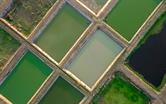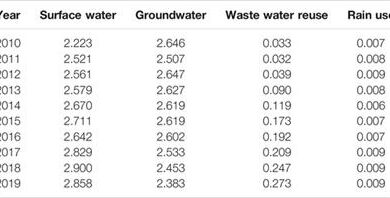Interdisciplinary Approaches in Wastewater Treatment and Water Resource Management

Wastewater treatment is a pressing global challenge driven by rapid urbanization, industrialization, and population growth. Conventional methods are resource-intensive, straining both economy and environment. In response, a shift toward water resource management through nature-based technologies (NBTs) emerges. NBTs, including constructed wetlands, biofiltration, algal ponds, green roofs, and vegetated buffers, leverage natural processes and ecosystems for sustainable wastewater treatment. They remove contaminants, reduce nutrient loads, and enhance water quality while offering additional benefits like habitat creation and carbon sequestration. This research topic spotlights NBTs’ pivotal role in wastewater treatment, emphasizing their adaptability in addressing various pollutants, from nutrients to heavy metals and pathogens. It also explores NBTs’ extra advantages, such as habitat creation and improved aesthetics. Furthermore, in the context of circular economy, NBTs contribute to the efficient utilization of resources by promoting the recycling and reuse of wastewater, fostering a more sustainable approach to managing water resources. By examining the synergy between wastewater treatment and water resource management through NBTs, this research topic fosters a holistic understanding of their interconnectedness, transcending traditional boundaries to reshape environmental sustainability.
The overall aim of this research topic can be summarized as follows:
-Holistic Understanding: This research topic aims to provide an all-encompassing view of wastewater treatment, emphasizing its connection with water resource management and the principles of the circular economy. By doing so, we intend to bring together interdisciplinary research and insights that explore the broader implications of wastewater management in the context of water resource sustainability.
-Knowledge Dissemination: Our primary goal is to disseminate knowledge that bridges the gap between traditional wastewater treatment methods and integrated water resource management. This will involve showcasing the latest scientific and technological advancements, as well as novel nature-based solutions that can optimize the efficiency and sustainability of wastewater treatment.
-Policy Implications: The research topic aims to explore the policy implications and regulatory frameworks necessary to ensure the effective integration of wastewater management into water resource strategies. By doing this, we hope to guide decision-makers and practitioners toward more efficient and sustainable solutions.
The Research topic “Interdisciplinary Approaches in Wastewater Treatment and Water Resource Management” will encompass, but not be limited to, the following topics:
-Nature-Based Wastewater Treatment: This includes research on innovative and environmentally friendly wastewater treatment technologies, such as constructed wetlands, green infrastructure, and ecological systems, which offer sustainable alternatives to conventional treatment methods.
-Water Quality and Quantity: Studies investigating the impact of wastewater discharge on the quality and quantity of water resources, including rivers, lakes, aquifers, and reservoirs. This involves assessments of pollutants, ecological consequences, and potential health hazards.
-Water Resource Planning: Research that explores the integration of wastewater management into broader water resource planning, addressing issues such as water scarcity, allocation, and the sustainable utilization of water resources. Cross-Disciplinary Collaboration: Contributions highlighting the significance of collaboration between different fields, such as environmental science, engineering, policy, and economics, to develop comprehensive solutions for wastewater treatment and water resource management. Case Studies and Best Practices: Examining successful case studies and best practices from around the world, showcasing effective strategies for wastewater management based on principles of circular economy within the context of water resource sustainability.
Keywords:
Wastewater treatment, Nature based solutions, Constructed wetlands, Bioretention systems, Floating treatment wetlands, Algal Ponds, Green Roofs, Sand Filters, Water Resource Management, Water Resource Sustainability, Circular economy
Important Note:
All contributions to this Research Topic must be within the scope of the section and journal to which they are submitted, as defined in their mission statements. Frontiers reserves the right to guide an out-of-scope manuscript to a more suitable section or journal at any stage of peer review.
Wastewater treatment is a pressing global challenge driven by rapid urbanization, industrialization, and population growth. Conventional methods are resource-intensive, straining both economy and environment. In response, a shift toward water resource management through nature-based technologies (NBTs) emerges. NBTs, including constructed wetlands, biofiltration, algal ponds, green roofs, and vegetated buffers, leverage natural processes and ecosystems for sustainable wastewater treatment. They remove contaminants, reduce nutrient loads, and enhance water quality while offering additional benefits like habitat creation and carbon sequestration. This research topic spotlights NBTs’ pivotal role in wastewater treatment, emphasizing their adaptability in addressing various pollutants, from nutrients to heavy metals and pathogens. It also explores NBTs’ extra advantages, such as habitat creation and improved aesthetics. Furthermore, in the context of circular economy, NBTs contribute to the efficient utilization of resources by promoting the recycling and reuse of wastewater, fostering a more sustainable approach to managing water resources. By examining the synergy between wastewater treatment and water resource management through NBTs, this research topic fosters a holistic understanding of their interconnectedness, transcending traditional boundaries to reshape environmental sustainability.
The overall aim of this research topic can be summarized as follows:
-Holistic Understanding: This research topic aims to provide an all-encompassing view of wastewater treatment, emphasizing its connection with water resource management and the principles of the circular economy. By doing so, we intend to bring together interdisciplinary research and insights that explore the broader implications of wastewater management in the context of water resource sustainability.
-Knowledge Dissemination: Our primary goal is to disseminate knowledge that bridges the gap between traditional wastewater treatment methods and integrated water resource management. This will involve showcasing the latest scientific and technological advancements, as well as novel nature-based solutions that can optimize the efficiency and sustainability of wastewater treatment.
-Policy Implications: The research topic aims to explore the policy implications and regulatory frameworks necessary to ensure the effective integration of wastewater management into water resource strategies. By doing this, we hope to guide decision-makers and practitioners toward more efficient and sustainable solutions.
The Research topic “Interdisciplinary Approaches in Wastewater Treatment and Water Resource Management” will encompass, but not be limited to, the following topics:
-Nature-Based Wastewater Treatment: This includes research on innovative and environmentally friendly wastewater treatment technologies, such as constructed wetlands, green infrastructure, and ecological systems, which offer sustainable alternatives to conventional treatment methods.
-Water Quality and Quantity: Studies investigating the impact of wastewater discharge on the quality and quantity of water resources, including rivers, lakes, aquifers, and reservoirs. This involves assessments of pollutants, ecological consequences, and potential health hazards.
-Water Resource Planning: Research that explores the integration of wastewater management into broader water resource planning, addressing issues such as water scarcity, allocation, and the sustainable utilization of water resources. Cross-Disciplinary Collaboration: Contributions highlighting the significance of collaboration between different fields, such as environmental science, engineering, policy, and economics, to develop comprehensive solutions for wastewater treatment and water resource management. Case Studies and Best Practices: Examining successful case studies and best practices from around the world, showcasing effective strategies for wastewater management based on principles of circular economy within the context of water resource sustainability.
Keywords:
Wastewater treatment, Nature based solutions, Constructed wetlands, Bioretention systems, Floating treatment wetlands, Algal Ponds, Green Roofs, Sand Filters, Water Resource Management, Water Resource Sustainability, Circular economy
Important Note:
All contributions to this Research Topic must be within the scope of the section and journal to which they are submitted, as defined in their mission statements. Frontiers reserves the right to guide an out-of-scope manuscript to a more suitable section or journal at any stage of peer review.



